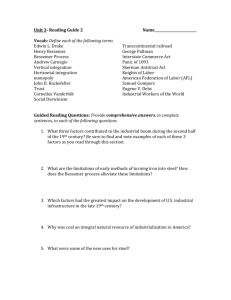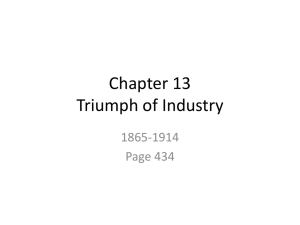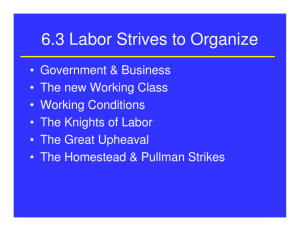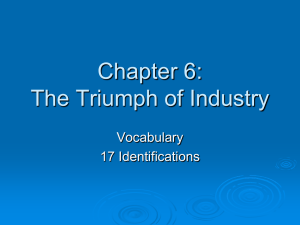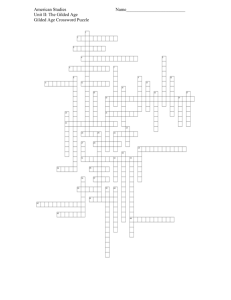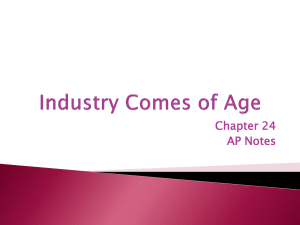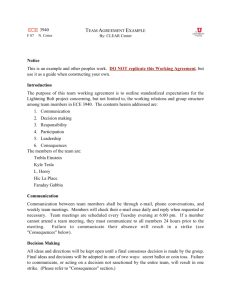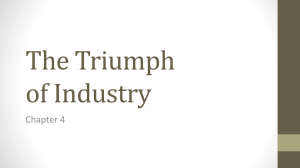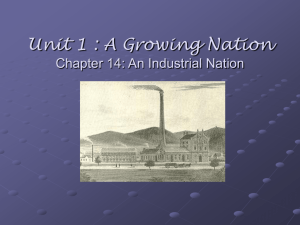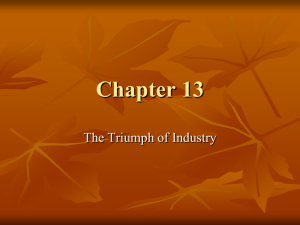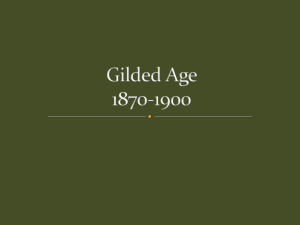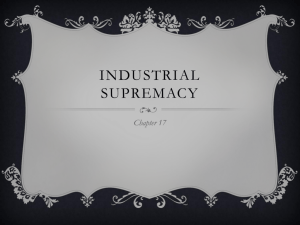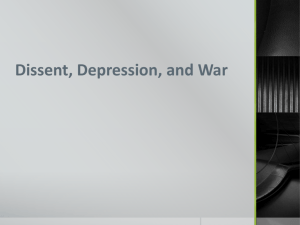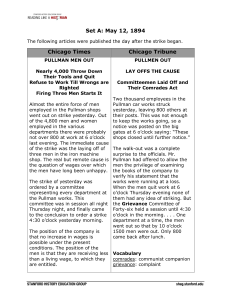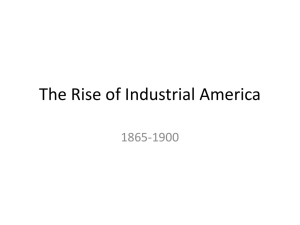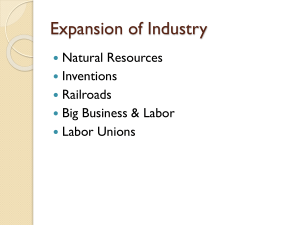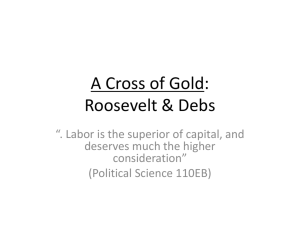Chapter 4
advertisement
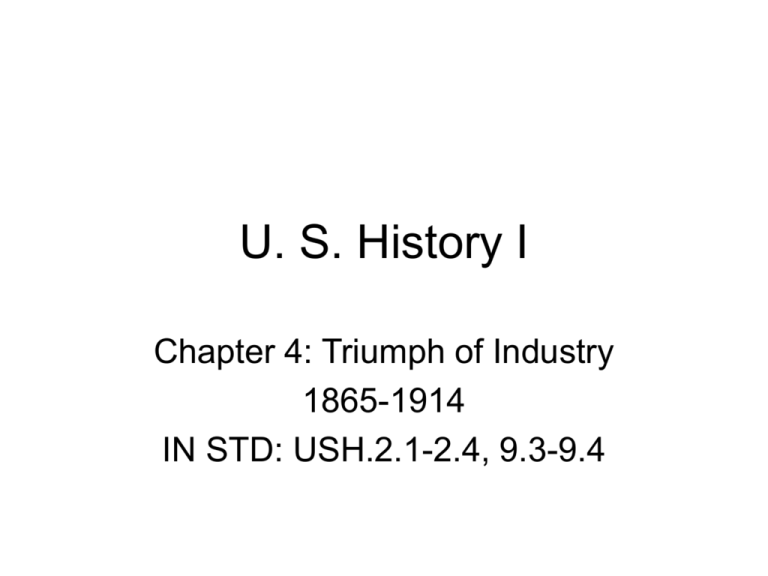
U. S. History I Chapter 4: Triumph of Industry 1865-1914 IN STD: USH.2.1-2.4, 9.3-9.4 Causes of the Industrialization 1. Natural Resources – Edwin Drake: Drilled first oil well in U.S. History in Titusville, Pennsylvania – Oil: Before: used to boil whale blubber/After: Kerosene and gasoline (after automobile) 2. Large Workforce - Immigration increased (Asia and Europe) 3. Capitalism and Entrepreneurs - Entrepreneur: One who risks (invests) money in order to make money - Horatio Alger: Wrote: “Rags to Riches” novels about “entrepreneurial spirit” 4. Government Policy -Laissez-Faire: “Free Enterprise” Government took “hand’s-off” approach to business (Supply/Demand) with little regulation (rules) -Protective Tariffs: Taxes on imports aimed at protecting local business “Rags to Riches” Novels: Horatio Alger Innovation Drives the Nation • Patent: Exclusive permission to develop and sell an Invention for a certain period of time • Thomas Edison: Inventor who set up Menlo Park Research Laboratory in New Jersey: Invented Light Bulb (1880) • Alexander Graham Bell: 1876: Patented Telephone • Gugliemo Marconi: Wireless Telegraph: “Father of Radio” STEEL • Bessemer Process: Henry Bessemer: Purifying Iron by “Blasting” it with intense heat • Suspension Bridges: Roadway suspended in air w/ steel cables. • -Brooklyn Bridge: 1883: First of its kind • Skyscraper: Used steel frames for height: Home Insurance Building: Chicago: First Skyscraper ever built Technology and Transportation • Railroads • George Westinghouse: 1869: Invented Air Brakes • Granville Woods: 1887: Train Telegraph • Gustavus Swift: Refrigerated Rail Car • BIG Problem: Times were set independently (Usually using sun) Scheduling Became Impossible • SOLUTION: 1884: 27 Countries created 24 “Time-Zones” • Airplane: 1903: Orville and Wilbur Wright: Kitty Hawk, N.C. First Successful Flight • FYI DID YOU KNOW: The Wright brothers (top) used an airplane design created by a Dr. Chanute (bottom) of Chicago. Chanute developed his design by flying his “glider” at the Indiana Sand Dunes! (Miller Beach)… so you could say that the Airplane was invented in Indiana!!! Spiral of Growth • Railroads stimulated (Sped up/helped) innovation and industrialization • -Brought Natural Resources from Western U.S. • Mass Production: Factories turned out large numbers of product in short amount of time. Impact of Industrialization • 1. Linked World Markets: Food…etc. • 2. Changed American Society: Growth of Cities • 3. Environmental Problems: Pollution • -National Park Service: 1872: Formed to protect environment against abuses of business. • *Yellowstone National Park: 1872: First National Park in U.S. History • *Indiana Dunes National Lakeshore: 1966 U.S. History I Chapter 4 Section 2 “The Rise of Big Business” Clockwise from top left: Standard Oil, Vanderbilt Mansion, Monopoly Board Game, J.P. Morgan Chase Building The Corporation • Corporation: Many people “share” ownership of ONE company • Monopoly: Complete control of a product or service • Cartel: Businesses agree to make same product and limit supply to drive up prices. (OPEC-oil, De Beers-diamonds) • J.D. Rockefeller: Standard Oil/ Controlled Railroads to “corner” oil market • J.P. Morgan: Developed research labs • Cornelius Vanderbilt: Railroad tycoon: N.Y. to Chicago direct rail line. Vertical/Horizontal Integration • Horizontal Integration: Consolidate many firms into one business (Super Company) ** Was Illegal Trust: Companies assign stock to board of TRUSTEES who get paid with stock profits (Made Horizontal Integration Legal) Vertical Integration: Control ALL businesses involved in product development (Monopoly: Own the Board) Andrew Carnegie: U.S. Steel/Pittsburgh, PA The Big Business Debate • Support: “Captains of Industry” • 1. Efficient • 2. Lower Prices • 3. Provided Jobs • 4. Made U.S. Powerful • 5. Philanthropists: Helped fellow man • Against: “Robber Barons” • 1. Unfair Advantages • 2. Drove Small businesses out • 3. No Competition • 4. Monopolies would RAISE prices • 5. “Swindle” Poor Big Business Debate Social Darwinism • - Charles Darwin: On the Origin of Species Animals evolved through Natural Selection “Survival of the fittest” Social Darwinism: Wealth was a measure of one’s value and those who had it were “fit” Those who do not should “adapt” - * Many used theory as a way to discriminate against minorities and other “poverty-stricken” Americans and Immigrants because of their “unfitness” Government Regulations • Interstate Commerce Commission (ICC): Could monitor railroads that cross state lines. Then refer records to Congress to address “unfairness” • Sherman Anti-trust Act: Outlawed Trusts/Monopolies that limited trade among several states • Read Wealth: Page 113: Andrew Carnegie U.S. History I Organized Labor Movement Chapter 4 Section 3 2.1, 2.4, 9.3 Worker Hardships • Immigrants and poor exploited by big business: (Low Wages) • Long Days: (12 Hour/ 6 Days per week) • Unsafe conditions: Sweatshops: Small, hot, dark, and dirty: Triangle Shirt waste Co. NYC (Top) • Children exploited (20% 1016 Employed 1890’s) • Company Towns: Pullman Town-Chicago (Bottom) Isolated communities owned by company • Company Stores: Workers forced to shop at company owned stores that overcharged them • http://www.ernieford.com/Si xteenTons.htm Labor Unions Form • Collective Bargaining: negotiating with employer as a group: Strikes used to force negotiation (Top Left) • Socialism: Favors PUBLIC control of property/ Opposite of Capitalism (Private Ownership) (Karl Marx: Communist Manifesto) • Knights of Labor: Industrial Union: Uriah Stephens • 1881: Terence Powderly : Became president (Bottom) • American Federation of Labor: Samuel Gompers: “Skilled worker” Union (Top) Strikes Rock the Nation • Railroad Strike of 1877: First major strike in U.S. History (Wages): Government sided w/ Business and Violence Erupted • Haymarket Riot: 1886: Chicago: Knights of Labor (Fair Wages/ 8 HR Work Day) • Anarchists: Antigovernment: Joined protest: Bomb Exploded: Dozens Killed/ Including Police Strikes Rock the Nation • Homestead Strike: Pennsylvania: U.S. Steel (protest wage cuts during depression) • Pinkerton: Private “Strike Breaking” Police Force (intimidate workers) *Anarchist tried to assassinate Henry Frick: (Carnegie’s Partner) *Government Sided w/ Business Strikes Rock the Nation • Pullman Strike: 1893: Pullman Palace Car Company: Chicago • Eugene Debs: American Railway Union President *Workers blocked trains from running during strike. *Pullman attached MAIL CARS to his *Grover Cleveland sent troops to end strike *Eugene Debs arrested for “federal offense” Effects on Labor Movement • Trend: general course of events • Government trend was to side with business • Socialism spread through U.S. • Eugene Debs: Ran for President in 1900 • *Radical ideas continued to spread because of Industrial worker’s “perception” of unfairness DID YOU KNOW? • During a coal miner’s strike in 1921, miners in West Virginia (Battle of Blair Mountain) wore red handkerchiefs around their necks to show unity. • They were nicknamed “rednecks”! • …Oh yeah… and the color red is usually associated with Communism (Marxism), too!
